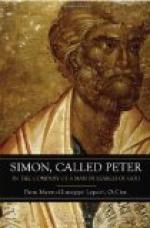He wondered if he should speak to Mackay, and, so wondering, fell forward on his knees.
CHAPTER IV
Hilda’s religion was, like the religion of a great many Englishwomen of her class, of a very curious sort. She never, of course, analysed it herself, and conceivably she would object very strongly to the description set down here, but in practical fact there is no doubt about the analysis. To begin with, this conventional and charming young lady of Park Lane had in common with Napoleon Bonaparte that Christianity meant more to them both as the secret of social order than as the mystery of the Incarnation. Hilda was convinced that a decent and orderly life rested on certain agreements and conclusions in respect to marriage and class and conduct, and that these agreements and conclusions were admirably stated in the Book of Common Prayer, and most ably and decorously advocated from the pulpit of St. John’s. She would have said that she believed the agreements and conclusions because of the Prayer Book, but in fact she had primarily given in her allegiance to a social system, and supported the Prayer Book because of its support of that. Once a month she repeated the Nicene Creed, but only because, in the nature of things, the Nicene Creed was given her once a month to repeat, and she never really conceived that people might worry strenuously about it, any more than she did. Being an intelligent girl, she knew, of course, that people did, and occasionally preachers occupied the pulpit of St. John’s who were apparently quite anxious that she and the rest of the congregation should understand that it meant this and not that, or that and not this, according to the particular enthusiasm of the clergyman of the moment. Sentence by sentence she more or less understood what these gentlemen keenly urged upon her; as a whole she understood nothing. She was far too much the child of her environment and age not to perceive that Mr. Lloyd George’s experiments in class legislation were vastly more important.
Peter, therefore, had always been a bit of an enigma to her. As a rule he fitted in with the scheme of things perfectly well, for he was a gentleman, he liked nice things, and he was splendidly keen on charity organisation and the reform of abuses on right lines. But now and again he said and did things which perturbed her. It was as if she had gradually become complete mistress of a house, and then had suddenly discovered a new room into which she peeped for a minute before it was lost to her again and the door shut. It was no Bluebeard’s chamber into which she looked; it was much more that she had a suspicion that the room contained a live mistress who might come out one day and dispute her own title. She could tell how Peter would act nine times out of ten; she knew by instinct, a great deal better than he did, the conceptions that ruled his life; but now and again




